
Even though menopause is a totally natural process, it can also be very nerve-wracking and frustrating. Not only is it tricky to find reliable information about how to go through menopause naturally, but many times we’re told to simply “cope” best we can.
Furthermore, standard treatment options like hormone therapy may work for one woman, but not the next.
And for some women, hormone therapy can create nasty side effects.
The fact is you need and deserve more options.
That’s what this article is all about.
We’re going to take a look at:
- The main factors that contribute to menopause symptoms.
- Dietary and lifestyle habits that can give you much needed relief.
- How to get started with a menopause diet plan.
Before we dive in, please note that this post will also talk about symptoms related to perimenopause and menopause.
Everything is connected and by covering what happens in the lead up to menopause, you will get a better understanding of how your body works.
Also, we will get into some technical details about hormone function.
My goal isn’t to overwhelm you. Rather, my hope is that by understanding more of the technical details about your body, you will feel empowered and confident to make choices that will help you thrive now (and for decades to come)!
Note: this post contains affiliate links and I earn a commission (at no additional cost to you) if you use them to make a purchase.
4 FACTORS THAT CONTRIBUTE TO MENOPAUSE SYMPTOMS
Whether it’s weight gain, hot flashes, or joint pain, menopause symptoms are usually attributed to low estrogen.
But it’s important to keep in mind that low estrogen alone isn’t actually a cause. It’s simply part of the mechanism that nature has put in place for menopause.
Furthermore, estrogen isn’t the only major hormonal change that occurs during menopause.
Progesterone and testosterone also go through significant shifts.
This makes sense since the ovaries – which makes estrogen, progesterone and testosterone – is naturally designed to shut down during menopause.
So, in reality there are three major hormonal changes during menopause: estrogen, progesterone and testosterone all decline.
Having said that, these natural changes are not the sole cause of menopause symptoms. If that was the case then 100% of women would have menopause symptoms.
Yet, there are women who experience little to no menopause symptoms.
And this means that it’s not so much about “the change” itself.
Instead, symptoms show up because other factors are preventing your body from properly adapting to the naturally changes that are occurring.
Which brings us to the first thing that can contribute to menopause symptoms…
1. Chronic Stress
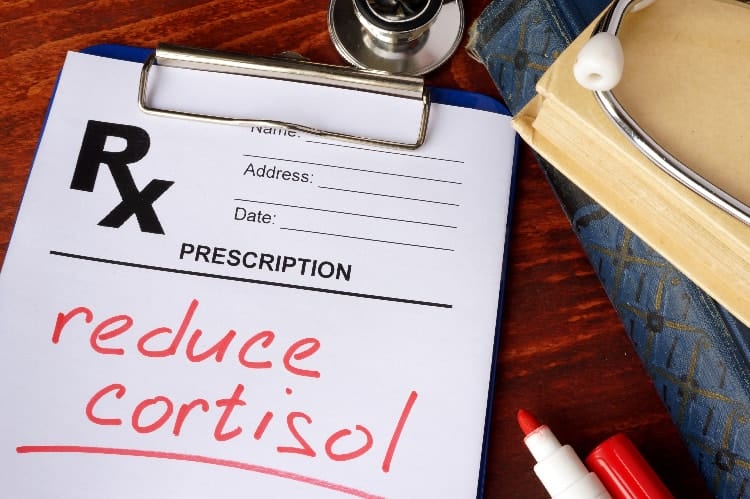
As the ovaries stop making sex hormones, the adrenals become the main production center for those sex hormones.
What’s worth noting here is that the adrenals already make some sex hormones during our reproductive years.
But with menopause, the adrenals take over and become the main production center.
This means the adrenals make sex hormones in addition to all the other hormones it already produces, such as (source):
- Cortisol, which is released in response to stressful conditions.
- Aldosterone, a hormone that regulates blood pressure and some electrolytes.
- Epinephrine and norepinephrine, which are activated mainly during physically and emotionally stressful situations.
- Corticosterone, which works together with cortisol to regulate immune response and regulate inflammatory response.
Under healthy and balanced conditions, the adrenals can do all of this (and produce sex hormones) without struggle.
However, there’s one thing that will for sure throw the body’s stress response system – and particularly, the adrenals – off balance: chronic stress.
So, what types of stress put the adrenals on overload?
There are 3 types:
- Physical stress: a wound or injury, misalignment in a specific part of the body.
- Chemical stress: this comes from toxins like pesticides, herbicides, ingredients in processed foods (additives, preservatives, refined sugar or fats), viruses, bacteria or fungus (such as candida), artificial ingredients in cosmetics and skincare products.
- Emotional stress: demanding job, financial worries, strained relationships and so on.
So, if you already had lots of stress leading up to menopause, or you’re now in menopause and are under stress, this will increase the workload on your adrenals.
And when the adrenals are overworked, other processes in your body are affected too, as we’re about to see…
2. Thyroid Imbalance
So, stress wears out the adrenals. Nothing too surprising there, right?
But on the flip side stress also affects the thyroid.
This is because the adrenals and thyroid have an inverse relationship.
This means:
- When adrenal function goes up, thyroid function goes down.
- When thyroid function goes up, adrenal function goes down.
Once again, this is just your body’s natural design.
And this inverse relationship is not a problem if we’re talking about short-term stress.
However, if you have lots of stress that lasts for months or years, then that will further suppress thyroid function.
Any disruption in thyroid function is problematic because the thyroid regulates metabolic processes related to (source):
- body temperature
- heart rate
- weight loss/gain
- breaking down old bone and rebuilding new bone
- digestion
- breathing
- menstrual cycle
- cholesterol levels
- mood…
…and a whole lot more.
As you can see, if the thyroid isn’t healthy, you’ll have a harder time with temperature regulation (which can affect symptoms like hot flashes).
Or, if your thyroid isn’t functioning correctly, then you can experience things like irregular heartbeat.
So, it’s important to be aware that stress affects both your adrenals and thyroid.
And it doesn’t matter whether you have a thyroid problem first or an adrenal problem first…that inverse relationship always applies.
Note: all this is not to say that you can’t legitimately have a thyroid issue that is caused by iodine deficiency (another common contributor to thyroid imbalance). However, if you’ve tried supplementing with iodine and haven’t seen much improvement in thyroid function) then it’s likely due to the stress-adrenals-thyroid factor.
3. Estrogen Dominance
Ok, so this one probably seems out of place.
After all, how can estrogen dominate when it’s supposed to be declining?
Well, according to the Centre for Menstrual Cycle and Ovulation Research more and more studies are now showing that estrogen levels are actually elevated during perimenopause (source).
In fact, one particular study compared a group of 47-year old women to a group of women aged 19 to 38. The 47-year olds had surprisingly higher levels of both estrogen and progesterone.
In addition, xenoestrogens in our food and environment can contribute significantly to estrogen dominance both during perimenopause and during the post-menopause phase.
These xenoestrogens are external forms of estrogen, which are known to mimic, and interfere with, natural estrogen.
Some common sources of xenoestrogens are (source):
- pesticides
- meats (non-organic)
- dairy (non-organic)
- public water systems
- cosmetics
- plastics
Regular exposure to one or more of the above can artificially raise your estrogen and make it more dominant.
Lastly, stress can also worsen estrogen dominance.
This is because stress leads to the production of more cortisol. And in order to make more cortisol, your body needs a hormone called pregnenolone.
Pregnenolone is also what your body uses to make progesterone.
So what happens when your cortisol needs increase?
Well, your body uses more pregnenolone to make cortisol…which means you end up making less progesterone.
And that lower level of progesterone ends up making estrogen more dominant.
Some symptoms that indicate estrogen dominance include:
- weight gain
- heavy bleeding during perimenopause
- hot flashes
- insomnia and erratic sleep patterns
- mood swings
- fibroids
- anxiety
- hair loss
- cold hands and feet
For more on this topic, read this post on estrogen dominance during perimenopause.
4. Chronic Inflammation and Insulin Resistance
Inflammation is basically the end result of everything we’ve talked about in this section.
As stressors pile up, chronic inflammation piles up.
Chronic inflammation means your body is in fight-or-flight or survival mode.
The body prioritizes survival over everything. As a result, your resources (i.e. nutrients) can end up being redirected towards cooling down that inflammation.
And the end result is that there’s very little left for everything else.
That’s why you end up experiencing a wide array of symptoms, from low libido and vaginal dryness, to irritability, dry skin and weight gain.
In addition, when there’s chronic inflammation, insulin resistance is more likely to occur.
In fact, experts say that women near menopause and in menopause are more likely to develop insulin resistance (for reasons such as changes in thyroid and adrenal hormones) (1, 2).
So, we covered a lot in this section!
Even though it may seem like a nasty, intricate web, it really all boils down to the usual basics: diet and lifestyle.
The more you prioritize a diet and lifestyle that minimizes stress, and inflammation, then the easier it is to go through menopause naturally (and not lose your mind).
7 STEPS FOR GOING THROUGH MENOPAUSE NATURALLY
1. Make Anti-Inflammatory Foods A Core Ingredient In Your Menopause Diet
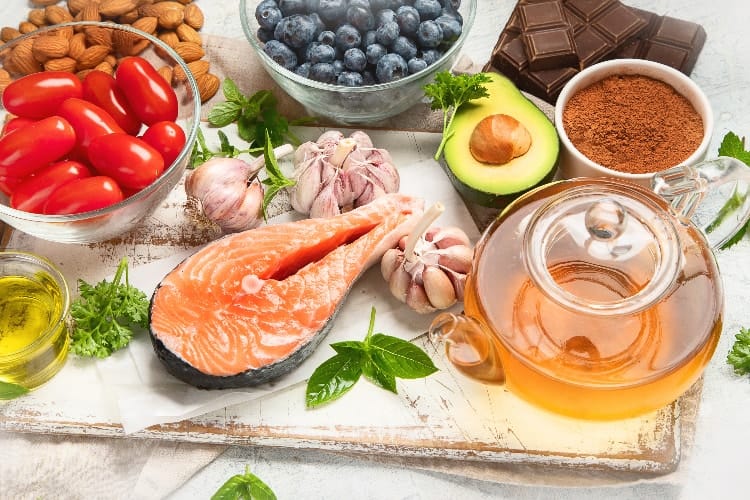
No surprise here: the most significant thing you can do to support your body through menopause is to eat an anti-inflammatory diet.
This means a diet that contains:
- mostly plants (fruits, veggies, legumes, whole grains).
- natural fats (raw nuts and seeds, avocados, coconuts, and healthy oils like coconut, olive or avocado oil).
- low in processed foods.
- gut-friendly probiotic foods.
- natural sugars (fruits, sweet veggies, raw honey, pure stevia leaf).
You can get a detailed breakdown of foods and download a free hormone balance diet guide here.
2. Consider Using An Herbal Supplement
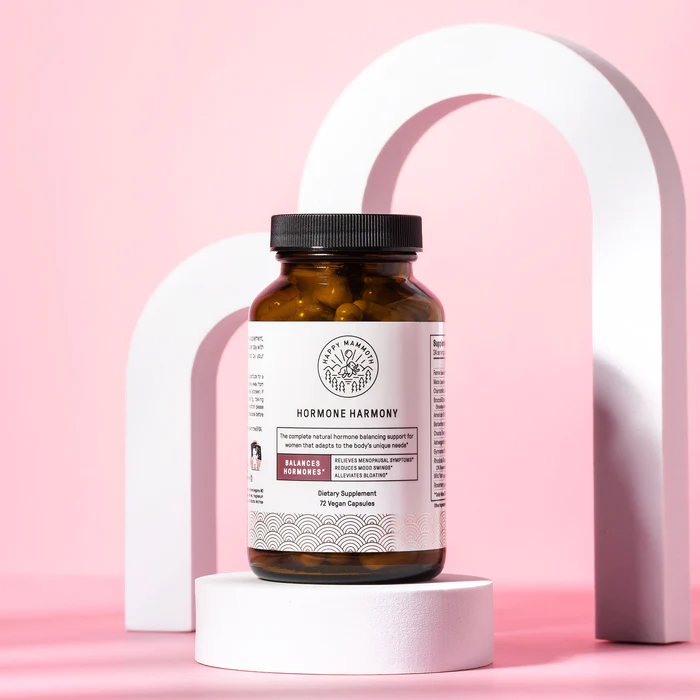
Since there are many different factors at play during menopause, a supplement formulated with various herbs could help you get relief (while you work on diet and lifestyle for the long-term).
One supplement to look into is Hormone Harmony from the brand Happy Mammoth.
It’s an impressive blend of herbs that support different systems in the body and with 10,000+ reviews, it’s clear that there are other women benefiting from it.
The reviews indicate that it helps with:
- hot flashes and night sweats.
- insomnia.
- bloating.
- PMS.
- mood.
- energy.
In addition, some reviewers say that this supplement helped them with weight loss. That said, I wouldn’t look at this as a magic bullet for weight loss. Instead, use the supplement to support your body on the path to your weight goals (together with a healthy diet).
Some of the key ingredients in this formula include:
- Adaptogenic herbs like maca and ashwagandha which help to balance cortisol and support our stress response system.
- Berberine and gymnema, both of which are used for insulin resistance. In addition, may also help with reducing sugar cravings.
- Anti-bloat and digestive support herbs like fennel.
- Calming herbs like chamomile and rosemary.
3. Use Essential Oils For Physical and Emotional Support
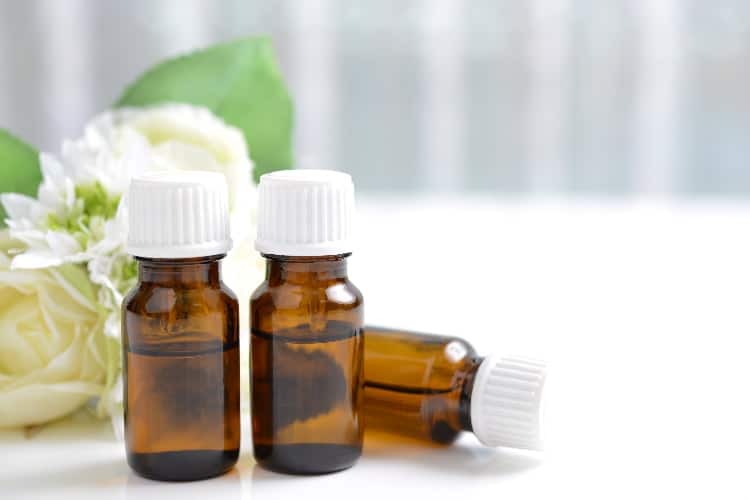
Whether you’re trying to sleep better, boost your mood, lower stress or boost libido, well, there’s an essential for that!
Clary sage, ylang ylang, vitex and thyme essential oils are just a few of the essential oils that you can use for menopause.
I have several posts on essential oils that you can use to get started.
Here they are:
- 11 Essential Oils for Menopause and How to Use Them
- DIY Essential Oil Spray For Hot Flashes: 5 Recipes To Use
- Essential Oil Roller Recipe for Hot Flashes
4. Be Uncompromising About Self Care
Yes “self care” just might be the most overused term these days…but it’s only because we desperately need it.
Our happiness and well-being depends on it.
The only way to reduce stress is to slow down.
You have to slow down to cook a healthy meal…slow down to eat that meal…slow down to just tune out all the noise.
We live in such a goal-oriented world with lots of to-do lists.
And sometimes our to-do lists don’t even have room for us.
It’s filled with everything that is outside of us.
But as we’ve seen in this article, every cell in your body responds to your lifestyle.
So, if you want to turn down that stress response, then start making time for yourself.
Whether it’s quiet time to sip a cup of tea, watch/read something that fulfills you, meditate or even time to literally do nothing…go ahead and be self-centered 🙂
Being truly self-centered (i.e. prioritizing your well-being so that you can then go on and give your best to the world) is an essential ingredient in health and happiness.
If you need some ideas to get you started, read this post on self care for hormone balance.
5. Move Your Body Regularly With Low Intensity Activities

Our bodies need regular movement. Not only does it keep us physically fit, but it also clears our minds and makes us feel mentally strong.
With menopause it’s important to be mindful of the type of exercise you do.
Strenuous exercise tends to increase stress and if your symptoms are severe, then you may not recover very easily from a hard workout.
So, you’re better off going with less stressful activities like:
- yoga
- tai chi
- qi gong
- pilates
- walking
- low to moderate difficulty hikes
- dancing (all depends on the type…some can be quite demanding)
6. Eat Your Water
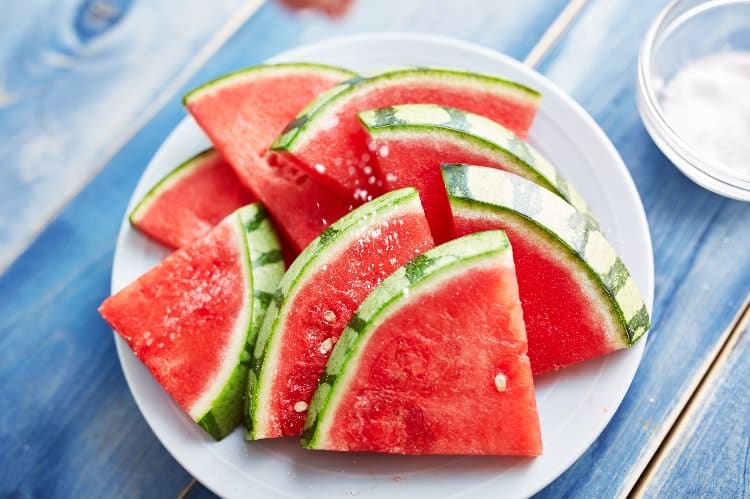
Staying hydrated helps with the elimination of waste, improves dry skin and also helps you feel full longer.
And even though drinking water is important, eating water-rich foods is also a must.
Aside from the fact that water-rich foods contain lots of nutrients, they actually keep you hydrated for longer.
You see, the water from a watermelon is released at a slower pace than the water you gulp down in one go.
This slow release prevents dehydration and helps with the dryness (both on the face and vaginal tissues) that frequently occurs during menopause.
7. Reset Your Hormones With A Gentle Detox
If you’re committed to going through menopause naturally, then you have to set aside some time for a detox.
Detoxing helps you to start feeling better faster because it:
- Eliminates toxins.
- Gives the body a chance to rest, recharge and recover.
- Allows you develop new habits that will keep you healthy and vibrant for years and decades to come.
If you’re not sure how to go about detoxing, have no worries because we’ll get into that in the next section!
RELATED QUESTIONS
Is Magnesium good for menopause?
Magnesium has many benefits and can be helpful for improving sleep, supporting heart and bone health, and boosting mood.
Magnesium deficiency is also one of the most common deficiencies in the U.S. So, eating magnesium-rich foods and using a supplement with magnesium is important.
Does b12 help with menopause?
Having sufficient levels of B12 can increase energy, improve tingling in the hands or feet, support bone health and also maintain healthy cognitive function.
What is the best natural hormone replacement for menopause?
For some women herbs like red clover, vitex and black cohosh can be a good natural alternative to hormone replacement.
In addition seed cycling (which involves eating specific seeds at regular intervals each month) can help regulate your hormones during menopause.
This post goes into more details about how to do seed cycling for hormone balance.
How can I kick start my metabolism at 50?
Since a slow metabolism is strongly tied to stress and inflammation, the best thing to do is to eat an anti-inflammatory diet, exercise regularly to reduce stress and also incorporate other stress management strategies (like meditation and the use of essential oils).
CONCLUSION: IS IT BETTER TO GO THROUGH MENOPAUSE NATURALLY?
In summary, the best way to go through menopause naturally is to focus on a diet and lifestyle that keeps inflammation (and stress) low.
By taking this holistic approach, you really can thrive during menopause and you can avoid questionable treatments or surgeries (which sometimes come with serious and irreversible side effects)
I hope this post inspires you to start building new habits so that you can reclaim your health and happiness.
And as always, if you have any questions or feedback, go ahead and drop a comment below!
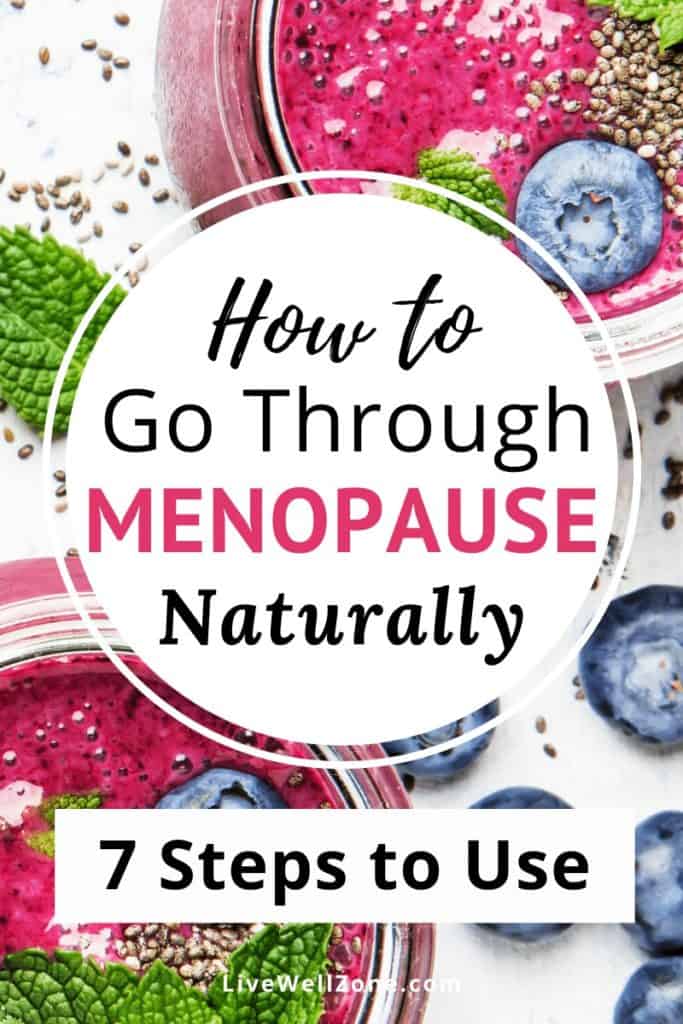
Related Posts:
Herbs for Menopause Weight Gain (+ Best Supplement Recommendations)
Hot Flashes No More: Top 10 Menopause Supplements for True Relief
Best Milk For Menopause: Dairy vs Plant-Based
Best Menopause Supplements Without Black Cohosh
From Chaos to Calm: 7 Soothing Herbs for Menopause Mood Swings
Hibiscus Tea and Menopause: Benefits For Hot Flashes, Estrogen Balance and More
Menopause Smoothie: Best Ingredients To Use For Relief (+ Recipes)
Cool Off Naturally: 12 Powerful Herbs for Menopause Hot Flashes
Everything You Need To Know About Estrogen Dominance During Perimenopause


I want help with my hormones.
You can start with my menopause program. Otherwise if you’re looking to work one-on-on then send me a message here so that we can connect privately. Thanks!
Great information 👌
Glad this was helpful 🙂
Loved this! Exactly what I needed! Thank you! ❤️
Glad you found it helpful 🙂